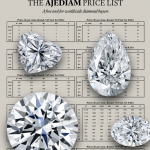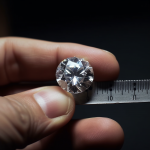Diamond Prices
Read more
Steer Clear Of Tricksters: All You Need To Know Before You Buy Diamonds
Comprehensive Guide to Purchasing Diamonds Safely
Purchasing a diamond is a significant investment, one that should be approached with due diligence and a deep understanding of the intricacies involved. With the rise in various scams in the diamond industry, it’s more important than ever to arm yourself with the knowledge to make an informed decision.
Here, we discuss seven common diamond scams and provide practical tips on how to avoid them. We summarize the signs to look out for when you think you may be dealing with a scammer. To finish we help you recognize if a diamond trader is trustworthy and has a good reputation.
The 6 most common scams to avoid when buying diamonds or diamond jewelry
Avoid Synthetic Diamond Scams:
Synthetic or lab-created diamonds are identical to natural diamonds in their chemical composition. However, they are created in a lab within weeks, leading to a lower price compared to natural diamonds. Some dishonest sellers may attempt to pass off these lab-created diamonds as natural ones.
Example: Imagine seeing a 1-carat diamond with excellent cut, clarity, and color at a price that seems too good to be true. On closer inspection, you find that it’s a lab-created diamond being sold as a natural one. Always ask for clear information about the origin of the diamond, and ensure this information is included in any certification provided.
Beware of Diamond Overgrading:
Overgrading refers to a diamond being graded more favorably than its true characteristics warrant. This scam often involves grading reports from less reputable or unrecognized labs.
Example: A diamond graded as having a color grade of D (colorless) and a clarity grade of VS1 (very slightly included) might sound appealing, but upon validation from a reputable lab such as GIA or AGS, the diamond could be revealed to be of a lower color and clarity grade. Always verify grading with recognized labs.
Fracture Filled Diamonds:
Fracture filling involves injecting a substance into a diamond to hide fractures or inclusions, making the diamond appear cleaner. Scammers may sell these diamonds as natural, untreated diamonds at a higher price.
Example: You may come across a diamond with exceptional clarity at an attractive price. However, if it’s a fracture-filled diamond, its true value would be significantly lower. Always inquire about potential treatments before purchase.
Bait and Switch Scams:
This scam involves a seller showcasing a high-quality diamond but delivering a lower-quality one. Always check that the diamond’s laser-inscribed report number matches the one on its accompanying report.
Example: You may purchase a diamond based on its initial presentation and later receive a diamond of inferior quality. Validate the diamond’s characteristics with its certification to avoid this scam.
Price Scams:
Sellers may inflate the price of a diamond, claiming it’s an investment that will appreciate. However, diamonds depreciate significantly once sold.
Example: A diamond could be sold at a significantly higher price under the pretext of future value appreciation. Be aware that diamonds, like cars, lose value after purchase, and are not typically a sound investment.
Jewelry Store Credit Scams:
Some stores offer attractive credit terms to entice customers into buying a diamond they can’t afford. Buyers may end up paying significantly more in interest and fees over time.
Example: A diamond ring priced at$5,000 could end up costing you much more if you’re roped into a credit agreement with high-interest rates and hidden fees. Always understand the terms of any credit agreement before making a purchase.
Recognizing a scammer in the diamond industry, or any industry for that matter
Recognizing a scammer can often come down to a combination of vigilance, knowledge, and intuition. Here are some key signs that you might be dealing with a scammer:
Too-Good-To-Be-True Offers
If a deal seems too good to be true, it probably is. This could be a dramatically discounted price or a diamond that’s presented as much higher quality than its price suggests. Genuine diamonds have a set market value and aren’t subject to extreme discounts. Discounts of “50% off” or “70% off” are virtually non-existent, as diamond value is based on quality and market trends, not promotional sales.
Lack of Transparency
A reputable diamond trader should be willing and able to provide clear, concise information about their diamonds. This includes grading reports from reputable labs and answers to any questions you may have. If a seller is evasive, vague, or hesitant to provide information, it’s a red flag.
Pressure Tactics
Scammers often try to rush their victims into making a decision. They may claim that a deal is time-limited or that there’s another buyer interested in the same diamond. A legitimate seller will respect your need to take your time and make an informed decision.
Absence of a Physical Address or Contact Information
Reputable businesses have physical locations and are easy to contact. If a seller only operates online and doesn’t provide a physical address or reliable contact information, proceed with caution.
Poor Online Reviews or Lack of Online Presence
Check for online reviews or testimonials. If a seller has a number of negative reviews, or if you can’t find any information about them online at all, it’s a cause for concern.
Non-Compliance with Industry Standards
Reliable traders are typically members of recognized bourses or organizations that require strict ethical conduct from their members. If a seller isn’t associated with any such organizations, it’s a potential warning sign.
In-House Grading Reports
Be wary of grading reports produced in-house by diamond jewelry stores. Without the stringent standards and unbiased perspective of a reputable external grading lab, such reports can be misleading.
Remember, knowledge is your best line of defense against scammers. Equip yourself with the right information, stay vigilant, and trust your instincts. If something doesn’t feel right, it’s better to walk away and continue your search elsewhere.
Assessing the Reputation of Diamond Traders and Jewelry Stores
When it comes to purchasing diamonds, the reputation of the dealer is of paramount importance. Ensuring you are working with a reputable trader or jeweler can provide peace of mind, as well as protect your investment. Here are some strategies to vet the credibility of your diamond source:
Online Reviews and Testimonials
In the digital age, a wealth of information can be found online about any business, and diamond traders or jewelry stores are no exception. Check your Google Maps App or Trustpilot which are the most common testimonial platforms. Start by checking online reviews and testimonials from previous clients. Feedback from others who have had direct experience with the trader or store can provide valuable insights into the quality of their diamonds, their customer service, pricing, and more.
Membership in Diamond Bourses or Professional Organizations
Membership in a diamond bourse or a professional organization is a strong indication of a trader’s credibility. These organizations have strict ethical requirements for their members, which can be a reliable guarantee of a trader’s professionalism and trustworthiness. For instance, in Antwerp, there are four diamond bourses that ensure their members adhere to high standards of conduct. Antwerp is unique in that it has four diamond bourses and here are their contact details:
- Antwerpse Diamantkring
- Address: Hoveniersstraat 2 – Box 515, B-2018 Antwerpen
- Telephone: +32 3 233 58 10
- Website: http://www.diamantkring.org/
- Email: exchangehall@diamantkring.org
- Beurs voor de Diamanthandel
- Address: Pelikaanstraat 78, B-2018 Antwerpen
- Telephone: +32 3 233 53 13
- Website: http://www.antwerpdiamondbourse.net/
- Email: info@diamondBourse.be
- Diamantclub van Antwerpen
- Address: Pelikaanstraat 62, B-2018 Antwerpen
- Telephone: +32 3 232 76 55
- Website: http://www.diamantclub.be/
- Email: dcva@pandora.be
- Vrije Diamanthandel
- Address: Pelikaanstraat 62, B-2018 Antwerpen
- Telephone: +32 3 232 70 13
- Email: vrijediamanthandel@skynet.be.
In addition to these bourses, the Federation of Belgian Diamond Bourses, also located in Antwerp, serves as a coordinating body:
- Address: Pelikaanstraat 62, B-2018 Antwerpen
- Telephone: +32 3 234 07 78
- Email: info@worldfed.com
Membership in these bourses signals that the diamond dealer adheres to the ethical and professional standards set by these organizations.
Certifications and Trust Labels
Look for certifications or trust labels that vouch for a trader’s or store’s commitment to quality and ethical practices. For example, ‘Antwerp’s Most Brilliant‘ is a label awarded to jewelers in Antwerp who meet strict quality, sustainability, and ethical standards. These labels and certifications can provide an added layer of assurance that you are dealing with a reputable trader or store.
Understanding Sales Terms and Guarantees
Before making your diamond purchase, it’s crucial to thoroughly understand the terms of sale and the guarantees offered by the trader or jewelry store. These terms can cover a variety of elements, including return policies, warranties, and servicing. Ensure that these terms are clear and in writing to avoid any potential misunderstandings down the line. If a trader or store is hesitant to provide clear terms or lacks a good guarantee policy, consider it a red flag.
Trusting Your Instinct through Personal Interactions
Despite all the research and precautions, an essential part of the diamond-buying process is your personal interaction with the trader or jeweler. Make an effort to meet with several jewelers or traders, ask them to explain their offer, and take note of how they conduct their business. Pay attention to their transparency, their willingness to answer your questions, and their overall demeanor.
A trustworthy trader will offer their assistance to you to understand the price of diamonds. They will show you their Rapaport price list and explain market pricing works, and how to avoid overpaying. Similarly, they will take the time to explain diamond qualities and sometimes even help you see yourself with the loupe so you can compare quality differences. They will advise you to choose diamonds with proper grading reports from a reputable lab such as GIA and explain how fluorescence or a bad cut will influence the price of the diamonds just as much as its 4Cs
Your instincts can often guide you when it comes to making a final decision. If a deal feels too good to be true, or if something about the transaction doesn’t feel right, don’t hesitate to walk away. There are plenty of reputable diamond traders and jewelers out there, so there’s no need to rush into a decision.
Buying a diamond is a significant investment, and it should be a pleasant experience. By taking the time to thoroughly vet your options and trust your gut, you can find a diamond that you will cherish without any regrets.



